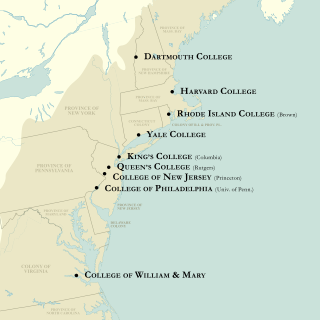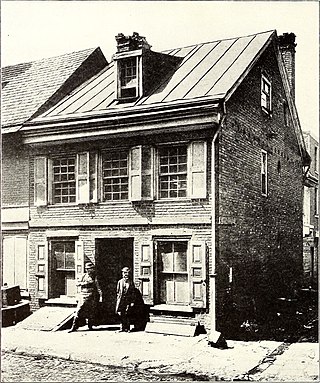Related Research Articles

John Harvard (1607–1638) was an English Puritan minister in Colonial New England whose deathbed bequest to the "schoale or colledge" founded two years earlier by the Massachusetts Bay Colony was so gratefully received that the colony consequently ordered "that the Colledge agreed upon formerly to be built at Cambridge shalbee called Harvard Colledge".
This article contains information about the literary events and publications of 1682.

The Middle Colonies were a subset of the Thirteen Colonies in British America, located between the New England Colonies and the Southern Colonies. Along with the Chesapeake Colonies, this area now roughly makes up the Mid-Atlantic states.

John Woolman was an American merchant, tailor, journalist, Quaker preacher, and early abolitionist during the colonial era. Based in Mount Holly, New Jersey, near Philadelphia, he traveled through the American frontier to preach Quaker beliefs, and advocate against slavery and the slave trade, cruelty to animals, economic injustices and oppression, and conscription. Beginning in 1755 with the outbreak of the French and Indian War, he urged tax resistance to deny support to the colonial military. In 1772, Woolman traveled to England, where he urged Quakers to support abolition of slavery.

The Province of Pennsylvania, also known as the Pennsylvania Colony, was a British North American colony founded by William Penn, who received the land through a grant from Charles II of England in 1681. The name Pennsylvania was derived from "Penn's Woods", referring to William Penn's father Admiral Sir William Penn.

The Harvard Classics, originally marketed as Dr. Eliot's Five-Foot Shelf of Books, is a 50-volume series of classic works of world literature, important speeches, and historical documents compiled and edited by Harvard University President Charles W. Eliot. Eliot believed that a careful reading of the series and following the eleven reading plans included in Volume 50 would offer a reader, in the comfort of the home, the benefits of a liberal education, entertainment and counsel of history's greatest creative minds. The initial success of The Harvard Classics was due, in part, to the branding offered by Eliot and Harvard University. Buyers of these sets were apparently attracted to Eliot's claims. The General Index contains upwards of 76,000 subject references.

The colonial colleges are nine institutions of higher education chartered in the Thirteen Colonies during the American Revolution before the founding of the United States. These nine have long been considered together, notably since the survey of their origins in the 1907 The Cambridge History of English and American Literature.

Garrett Hill is an unincorporated community in Radnor Township, Pennsylvania, United States, located approximately eight miles northwest of Philadelphia. The geographic area is located in the portion of the Bryn Mawr ZIP code that comprises Rosemont. The community is roughly bounded by Lancaster Avenue, Lewis Lane, Garrett Avenue and Lowrys Lane, with Conestoga Road acting as the central arterial Road. Although a predominantly working class community with blue collar roots, it is located on the Pennsylvania Railroad Main Line.

A county commission is a group of elected officials collectively charged with administering the county government in some states of the United States. A county usually has three to five members of the county commission. In some counties within Georgia a sole commissioner holds the authority of the commission.

The Frame of Government of Pennsylvania was a proto-constitution for the Province of Pennsylvania, a proprietary colony granted to William Penn by Charles II of England. The Frame of Government has lasting historical importance as an important step in the development of American and world democracy.

Pennsbury Manor is the colonial estate of William Penn, founder and proprietor of the Colony of Pennsylvania, who lived there from 1699 to 1701. He left it and returned to England in 1701, where he died penniless in 1718. Following his departure and financial woes, the estate fell into numerous hands and disrepair. Since 1939, a reconstructed manor has stood on the original property.
Moreland Township was a township that was located in Philadelphia County, Pennsylvania, United States.

"The pot calling the kettle black" is a proverbial idiom that may be of Spanish origin, of which English versions began to appear in the first half of the 17th century. It means a situation in which somebody accuses someone else of a fault which the accuser shares, and therefore is an example of psychological projection, or hypocrisy. Use of the expression to discredit or deflect a claim of wrongdoing by attacking the originator of the claim for their own similar behaviour is the tu quoque logical fallacy.

Thomas Penn was an English landowner and mercer who was the chief proprietor of Pennsylvania from 1746 to 1775. He was one of 17 children of William Penn, the founder of the colonial-era Province of Pennsylvania in British America. In 1737, Thomas Penn negotiated the Walking Purchase, a contested land cession treaty he negotiated with Lenape chief Lappawinsoe that transferred control over 1,200,000 acres (4,860 km2) of territory in the present-day Lehigh Valley and Northeastern Pennsylvania regions of Pennsylvania and a portion of West Jersey in colonial New Jersey from the Lenape tribe to the Province of Pennsylvania.
William Benson was a talented amateur architect and Whig politician who sat in the House of Commons from 1715 to 1719. In 1718, he arranged to displace the aged Sir Christopher Wren as Surveyor of the King's Works, but his short time in that post was not a success.

John Penn was an English politician and writer who was the chief proprietor of the Province of Pennsylvania from 1775 to 1776. He and his cousin, John Penn held unsold property, of 24,000,000 acres (97,000 km2), which the Pennsylvania legislature confiscated after the American Revolution.

William Penn was an English writer, religious thinker, and influential Quaker who founded the Province of Pennsylvania during the British colonial era. Penn, an advocate of democracy and religious freedom, was known for his amicable relations and successful treaties with the Lenape Native Americans who had resided in present-day Pennsylvania prior to European settlements in the state.
Powder Valley is a village in southern Upper Milford Township in Lehigh County, Pennsylvania. Powder Valley is part of the Lehigh Valley, which has a population of 861,899 and is the 68th-most populous metropolitan area in the U.S. as of the 2020 census.

Letitia Street House is a modest eighteenth-century house in West Fairmount Park, Philadelphia. It was built along the Delaware riverfront about 1713, and relocated to its current site in 1883. The house was once celebrated as the city residence of Pennsylvania's founder, William Penn (1644–1718); however, later historical research determined that he never lived there.
Richard Slator Dunn was an American author and historian.
References
- ↑ "Welcome to The Harvard Classics / Dr. Eliot's Five Foot Shelf" (Multiple). 51-volume anthology of classic works. Harvard University / Internet Archive. 1909. Retrieved November 12, 2011.
- ↑ Penn, William (1718). More fruits of solitude being the second part of reflections and maxims, relating to the conduct of human life.